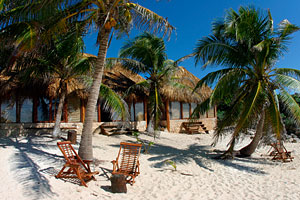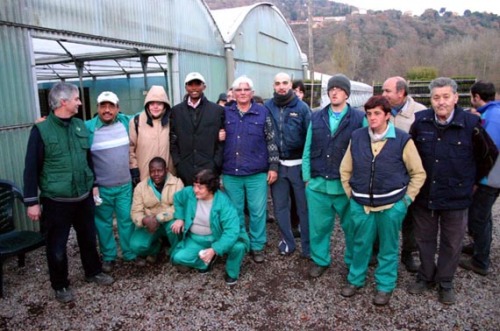Here at The Enchanting Group, our parent company, we have our own destinations for ecotourism. Today marks the beginning of our service trips at EcoTulum, a resort in Tulum, Mexico. There are two volunteers that are arriving at the EcoTulum resort, to embark on a week of fun and service. It is our first volunteer trip to this resort as EcoTulum (as well as Ulaa) tries to provide service opportunities in its unique location.
EcoTulum began in 1998 as an alternative vacation destination. They have beautiful but simple cabanas located directly on a white sandy beach, looking out over the blue Caribbean. EcoTulum believes in a truly holistic experience; the cabins are environmentally friendly, open air cabanas. They do not have air conditioning and electricity is turned off at 11PM. Visitors can enjoy free yoga classes, swim in the sea, hike in the rainforest, or explore ancient Mayan archaeological sites. The EcoTulum experience is quite different from your average Caribbean cruise.

EcoTulum is not finished though. This year they decided to host college volunteers for a reduced price to experience a unique volunteer service trip that they will never forget. EcoTulum’s proximity to the rainforest and Mayan ruins provides a wonderful opportunity for people to come and learn about biodiversity, ecological conservation, and Mayan culture. Their first 2 volunteers arrive today for a week of exploration, learning, and lots of fun. Their itinerary is as follows:
March 17: A two hour tour in the Bioregion to learn about the environment there, biodiversity, and the efforts to preserve the habitat. The tour will be followed by snorkeling in the Cenote Dos Ojos, a naturally occurring well full of plant and animal life. This area is of spiritual importance to the Mayan culture.
March 18 & 19: Volunteers will work with Flora, Fauna y Cultura.org, a local NGO. They will work on several projects in the area of Playa del Carmen—Eco Park la Seiva; helping to preserve wildlife and natural habitats like the native turtles; beach cleanup programs; and learning about reforestation efforts. http://www.florafaunaycultura.org/
March 20: Visit the Mayan ruins in Tulum and learn about the history of Mayan culture.
March 21: Free day.

EcoTulum began as an ordinary spa/resort but has decided to provide opportunities for college students to have an alternative spring break. EcoTulum is not starting this program because it’s going to be a big moneymaker; the students pay very little to stay at the resort and participate in the activities. The objective of hosting volunteers is also not for the work the students will provide; there is only so much you can do in a week. Rather the focus is on educating and changing the lives of the volunteers and creating an appreciation for the environment. If they can leave EcoTulum inspired by the natural beauty, and the biological and environmental wonders of the area, then the trip will have been a success. Hopefully, the volunteers will take home a new perspective on the environment, weave these lessons into their daily lives, and educate others. Maybe they will even decide to study ecology, or biology, or environmental law. Raising environmental and ecological awareness, in the end, is the measure of success for this program.
All inclusive vacations to Cancun may be common among college kids, but trips like that are redundant and cliche. EcoTulum ecological service trips are really different; a once in a lifetime experience. This is EcoTulum’s first trip, but they are ongoing, so if you are interested contact our service trip expert Sarah Maxwell. You can read her blog here, which has a wealth of information on service trips to Tulum and Ulaa. The EcoTulum resort is a wonderful resort that has decided to use some of its profits to fund a volunteer program, hosting students and providing a series of activities for ecological service and education.





